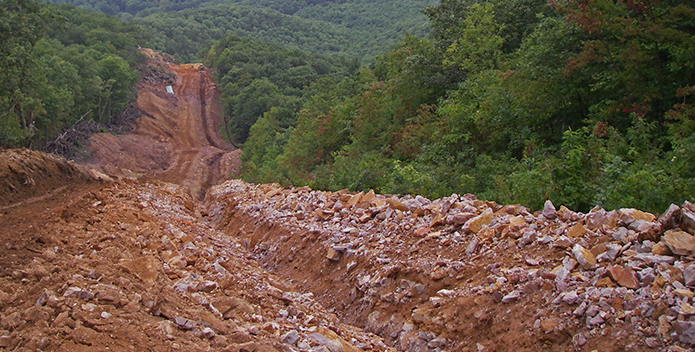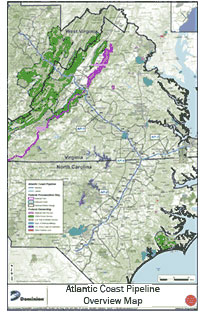Safeguarding Our Forests and Local Waters
As energy companies across the nation position themselves to tap into our country's natural gas reserves, many residents and environmentalists are concerned about the potential problems associated with extracting this valuable resource. No one disputes the need for local clean, efficient energy resources. But there are concerns over the land and water impacts that the infrastructure associated with natural gas drilling may cause. Natural gas infrastructure includes the construction and operation of hundreds of miles of pipeline, as well as compressor stations, well pads, and access roads.
Natural Gas Pipelines in the Chesapeake Bay Watershed
Natural gas production requires a network of pipelines to transport the natural gas throughout the Eastern United States. In order to meet the increase in production of natural gas in the Marcellus Shale, numerous pipeline projects are planned for the Bay watershed and surrounding region. The proposed pipelines cross hundreds of miles of rivers and streams, forests, farm land, and private land throughout the watershed. Among the many pipeline projects that are partially or fully within the watershed are the following large proposals:
- Atlantic Coast Pipeline—550 miles from West Virginia, through Virginia, to North Carolina
- Constitution Pipeline—124 miles from Susquehanna County, Pennsylvania to Schoharie County, New York
- Atlantic Sunrise Expansion Project—177 miles in Pennsylvania
- Northeast Energy Direct (NED) Project—135 miles from Susquehanna County, Pennsylvania to Schoharie County, New York (Cancelled due to lack of demand from power generators in the region)
Interstate natural gas pipelines, such as the ones above, must get approval from the Federal Energy Regulatory Commission (FERC). FERC has the responsibility and authority to consider the total combined environmental impacts of the natural gas pipelines that it approves.
The Concerns About Natural Gas Pipelines and Infrastructure
Some of the potential problems associate with natural gas pipelines and infrastructure include:
- Destruction of thousands of acres of vital habitat, forest, and pristine lands.
- Loss of the valuable water and air filtering that forests provide.
- Fragmentation of forest habitat and wildlife corridors and increased risk of invasive species along pipeline right-of-ways.
- Accelerated stormwater runoff—and its resulting increase in nutrient and sediment levels in nearby streams—as extensive areas are cleared, roads are degraded, and soils are compacted during construction and maintenance.
- Risk of severe erosion in steep or mountainous areas during pipeline construction.
- Increased air pollution due to compressor stations potentially leaking methane and toxic gases into the air.
These and other challenges underscore the need for comprehensive analysis of the environmental and quality of life impacts of natural gas pipeline and infrastructure development across the Chesapeake Bay watershed.
CBF's Position
CBF does not oppose natural gas development if done safely, nor have we called for a permanent ban on gas development in the region. Instead, we have embraced the precautionary principle. Our over-arching goal is to ensure that future energy development in the Chesapeake Bay region takes place in as safe and environmentally responsible a manner as possible.
What We've Done
CBF has commented on individual natural gas pipeline projects asking FERC to carefully consider the cumulative impacts and to use a strategic approach in authorizing the construction of natural gas pipelines and infrastructure in the region so as to ensure the least amount of environmental harm possible.




